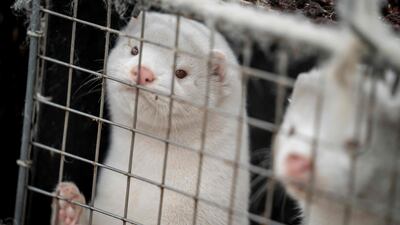Tens of thousands of minks have escaped from a fur farm in northern Ohio, local police reported.
Up to 40,000 of the carnivorous mammals were released from their cages and set free from the farm in Hoaglin Township.
Van Wert County Sheriff Thomas Riggenbach said on Tuesday that his office was investigating a breaking and entering and vandalism complaint at Lion Farms USA Mink Farm.
The incident is believed to have occurred overnight on Monday, with the suspects destroying fencing and releasing between 25,000 to 40,000 minks from their cages, the sheriff's office said in a Facebook post.
Many minks remained on the property but others escaped into the surrounding areas.
Eddie Meyer, manager of the mink farm, told local media outlet WANE 15 that the farm has been able to get back about 7,000 minks while the rest are being hunted by the farm and armed locals.
He estimated that about 95 per cent of the animals will die in the wild as they are essentially domesticated and not used to fending for themselves.
Though police have named no suspects in the investigation, WANE 15 reported that a wall near where the fence was cut had been spray painted with the letters “ALF” as well as the phrase: “We’ll be back.”
Exotic animal smuggling on the rise in India — in pictures
“ALF” is believed to refer to the Animal Liberation Front, an international resistance movement that engages in non-violent actions in protest against animal cruelty.
Mink is a prized material for fur coats and the animals are farmed across the country, with about 275 farms in 23 states, according to Fur Commission USA.
Fur farms are frequent targets of animal rights groups.
In 2017, animal rights activists released 40,000 minks from a farm in central Minnesota and in 2014, co-ordinated efforts in Idaho and Utah led to the release of about 2,000 of the animals. In 2014, activists attempted to rescue hundreds of foxes at an Iowa fur farm, though the attempt was ultimately unsuccessful.
While they may look cute, minks are known for their vicious tempers and when threatened, they may growl, hiss, screech or discharge a strong, musky scent similar to that of a skunk.
The sheriff's office warned local residents that minks are “carnivorous mammals” that “regularly hunt prey bigger than themselves”.
“As a result, they can be a bothersome pest for homeowners, livestock owners and property managers,” the office added.
“Minks have proven to be especially costly and problematic for poultry ranchers as well as homeowners with ornamental ponds filled with koi and other fish.”








